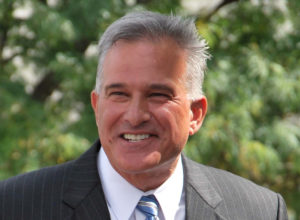The 2019 competition for who gets to be Allegheny County, Pennsylvania’s elected District Attorney for the next four years is the race that refused to die.
Incumbent District Attorney Stephen A. Zappala, who has held the position since 1998, has retrogressive stances on a number of key issues. He is an ardent supporter of tough-on-crime drug policies, including mandatory imprisonment for certain offenses.

Stephen A. Zappala (photo via Allegheny County DA’s Office)
Racial disparities are also a serious issue for his office: In 2016 and 2017, Black kids constituted the vast majority—over 80 percent—of the minors charged as adults by DA Zappala. Allegheny County, which includes the City of Pittsburgh, has about 1,220,000 residents, only 13.4 percent of whom are Black.
Back in May, Zappala defeated Turahn Jenkins, a Black public defender running on an anti-mass incarceration platform, in the Democratic primary.
Jenkins’ campaign suffered from early but justified turmoil. At a meeting with members of Pittsburgh’s LGBTQ community in July 2018, he replied “yes” when asked if he thought that being gay or trans was a “sin.” These homophobic beliefs—associated with Jenkins’ membership of the Bible Chapel in Wilkinsburg, PA, which espouses these and other offensive views—sparked outrage.
While Jenkins attempted to make amends, actively seeking over the course of his campaign to learn from and better understand the LGBTQ community—efforts that even led to an about-face endorsement from the Democratic Socialists of America’s Pittsburgh branch in April 2019—it was not enough. Zappala comfortably beat him by 59 to 41 percent.
The election has become a rallying point for criminal justice reformers.
But another challenger, Lisa Middleman, has now stepped forward to try to prevent Jenkins’ self-inflicted damage from depriving a major county of a reform-minded DA. Middleman, who is running as an independent, has been a public defender for 30 years, and supported Jenkins in his race against Zappala. She declared her candidacy in June, shortly after Jenkins’ defeat.

Lisa Middleman (photo via LisaMiddleman.com)
As reported by the Pittsburgh Post-Gazette:
The tipping point for her, she said, was when she realized that incumbent District Attorney Stephen A. Zappala Jr. did not participate—or designate someone from his office—in a University of Pittsburgh Institute of Politics Criminal Justice Task Force, which issued a report on improving incarceration tactics in Allegheny County in 2016.
“The one person missing was, arguably, the most powerful person in our criminal justice system—the district attorney,” Ms. Middleman said.
In a set of pledges similar to those made by Jenkins, Middleman promises that as Pittsburgh’s top prosecutor, she would eschew cash bail; create pre-trial diversion programs; study racial disparity issues; not pursue convictions under statutes with mandatory minimums; and not seek incarceration on technical probation violations.
The election, which will take place in November, has become a rallying point for criminal justice reformers in Pennsylvania, and for those following other key DA races around the country.
Allegheny County matters; in Pennsylvania, it’s second only to Philadelphia County in size. And Pittsburgh’s reformers can find inspiration by looking to Philly, which in 2017 elected the nationally famous reform DA Larry Krasner.
Top photo by Vidar Nordli-Mathisen on Unsplash




